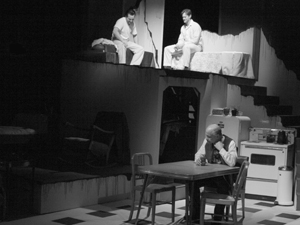Attention Must Be Paid

By Dennis Brown
Published: February 14, 2007
When the angst finally ended and Willy Loman was free at last, the applause that greeted the curtain call for the Muddy Waters Theatre mounting of Death of a Salesman rolled across the stage like a boulder. There was no air in this applause, no hint of reservation or mere politesse. The audience verdict was rock-solid: Arthur Miller's saga of dreams and evasions, which opened on Broadway 58 years ago this very week, has lost none of its crushing power. The play remains essential viewing, immediate and involving.
Is Salesman an American tragedy? Critics and essayists have long debated that question. This staging by Milton Zoth doesn't much care. Zoth directs the story for melodrama, which smolders in abundance. The emphasis here is on the howls of anguish and the whiplash reversals that occur in the Loman household between husband and wife, father and son, brother and brother. Why the undercurrent of moodiness in Biff, the prodigal son? Why Biff's churlish distance from his father? Such questions continue to engage an audience. Wherever I looked, viewers literally were sitting on the edges of their seats, totally absorbed.
Joel Lewis' eruptive portrayal of the estranged Biff is acting at its most organic. In exposing the pain of a lost soul, there's a sense that Lewis is not acting at all.
How to approach Willy, a character so contradictory that he is both a "damned fool" and a "troubled prince"? Physically forceful actors often bulldoze their way through the text, with the result that they overwhelm the role. Here Peter Mayer (who is of slighter build) allows himself to be overwhelmed by the role. He's at his best when at his most panic-stricken. "What happened in Boston, Willy?" someone asks, and Mayer freezes like an ice carving that has been out in the sun for too long.
Mayer often chooses to emphasize Willy's feeble anger rather than his bewilderment. Questions get asked like statements. The actor frequently jabs his finger into the air, as if it's an exclamation point. Most writers will tell you that exclamation points are most effective when used sparingly. It's those moments when Willy is seated and gazing up at his oppressors through hollow eyes, or moments like the one when Willy's last vestige of self-confidence simply crumbles in the pathetic confrontation with his young pup of a boss, that Mayer's Loman evokes the pitying depths of despair.
Mayer is supported by solid work. Carrie Houk's low-key Linda is effectively free of theatrics. This Linda is a study in forgiveness. Midway through Act One, Houk utters the play's most memorable line, "Attention must be paid," with a conviction and urgency that would have us believe she's making her plea for the first time. Tyler Vickers emanates an appealing fecklessness as the self-delusional son Happy, and Myron Freedman brings clear-water clarity to Charley, Willy's exasperated friend and neighbor. There's no embellishment here; Freedman simply reads the role, and we're able to see Charley as everything Willy is not.
Joel Lewis' eruptive portrayal of the estranged Biff is acting at its most organic. In exposing the pain of a lost soul, there's a sense that Lewis is not acting at all. Late in Act Two, after Biff makes a disillusioning discovery about his father, Lewis' face collapses like a rotting pumpkin. My guess is that Lewis doesn't even know it's happening, yet it provides an indelible image. This is acting so rooted in truth that it goes beyond performance.
No apology is needed for the fact that this is an inelegant staging, but does the production have to rub its cheapness in our faces? When playing spaces are too constricted for the actors to move, when furniture is wrong for the period, when actors are wearing ripped costumes, when a fedora makes one actor look downright foolish, I want to scream at the director or producer, "Can't you see these glaring flaws?" Yet by evening's end, as Mayer and Lewis are locked together in a stunning dance of death, the flaws become secondary, because what is happening onstage is transporting us to the purest kind of theatrical epiphany.
See the review at The Riverfront Times
Dennis Brown
February 14th, 2008